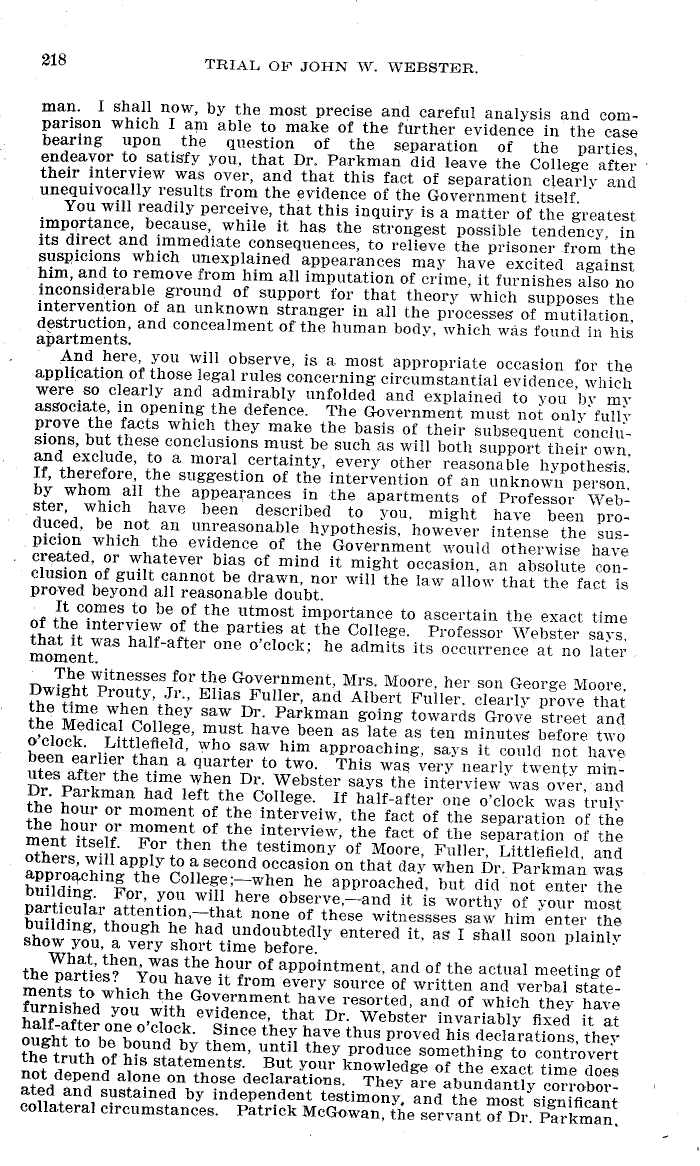|
21$ TRIAL OF JOHN W. WEBSTER.
man. I shall now, by the most precise and careful analysis and com-
parison which I am able to make of the further evidence in the case
bearing upon the question of the separation of the parties,
endeavor to satisfy you, that Dr. Parkman did leave the College after
their interview was over, and that this fact of separation clearly and
unequivocally results from the evidence of the Government itself.
You will readily perceive, that this inquiry is a matter of the greatest
importance, because while it has the strongest possible tendency, in
its direct and immediate consequences, to relieve the prisoner from the
suspicions which unexplained appearances may have excited against
him, and to remove from him all imputation of crime, it furnishes also no
inconsiderable ground of support for that theory which supposes the
intervention of an unknown stranger in all the processes of mutilation,
destruction, and concealment of the human body, which was found in his
apartments.
And here you will observe, is a. most appropriate occasion for the
application of those legal rules concerning circumstantial evidence, which
were so clearly and admirably unfolded and explained to you by my
associate, in opening the defence. The Government must not only fully
prove the facts which they make the basis of their subsequent conclu-
sions, but these conclusions must be such as will both support their own,
and exclude, to a moral certainty, every other reasonable hypothesis.
If, therefore the suggestion of the intervention of an unknown person,
by whom all the appearances in the apartments of Professor Web-
ster, which have been described to you, might have been pro-
duced, be not an unreasonable hypothesis, however intense the sus-
picion which the evidence of the Government would otherwise have
created, or whatever bias of mind it might occasion, an absolute Con-
clusion of guilt cannot be drawn, nor will the law allow that the fact is
proved beyond all reasonable doubt.
It comes to be of the utmost importance to ascertain the exact time
of the interview of the parties at the College. Professor Webster says,
that it was half-after one o'clock; he admits its occurrence at no later
moment.
The witnesses for the Government, Mrs. Moore, her son George Moore,
Dwight Prouty, Jr., Elias Fuller, and Albert Fuller, clearly prove that
the time when they saw Dr. Parkman going towards Grove street and
the Medical College, must have been as late as ten minutes before two
o'clock. Littlefield, who saw him approaching, says it could not have
been earlier than a quarter to two. This was very nearly twenty min-
utes after the time when Dr. Webster says the interview %vas over, and
Dr. Parkman had left the College. If half-after one o'clock was truly
the hour or moment of the interveiw, the fact of the separation of the
the hour or moment of the interview, the fact of the separation of the
ment itself. For then the testimony of Moore, Fuller, Littlefield, and
others, will apply to a second occasion on that day when Dr. Parkman was
approaching the College; when he approached, but did not enter the
building. For, you will here observe, and it is worthy of your most
particular attention,-that none of these witnessses saw him enter the
building, though he had undoubtedly entered it, as I shall soon plainly
show you, a very short time before.
What, then was the hour of appointment, and of the actual meeting of
the parties. You have it from every source of written and verbal state-
ments to which the Government have resorted, and of which they have
furnished you with evidence that Dr. Webster invariably fixed it at
half-after one o'clock. Since they have thus proved his declarations, they
ought to be bound by them, until they produce something to controvert
the truth of his statements. But your knowledge of the exact time does
not depend alone on those declarations. They are abundantly corrobor-
ated and sustained by independent testimony, and the most significant
collateral circumstances. Patrick McGowan, the servant of Dr. Parkman,
|

